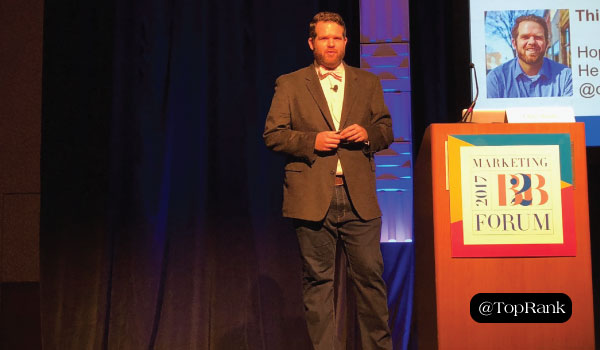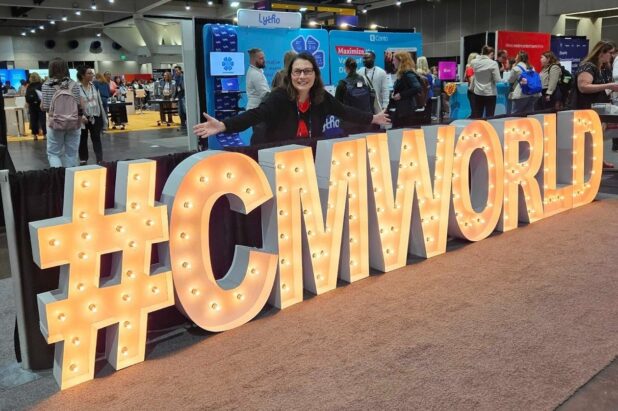
Budget is always top of mind for content marketers, but especially this time of year. In order to get even close to the budget that you want or need, you have to justify the spend.
Unfortunately, we’ve been ineffective at content for a while. But the question is, can we change the narrative?
In his presentation last week at the MarketingProfs B2B Marketing Forum, GE Digital’s Chris Moody gave the audience insights into why we’re ineffective, and what we can do to improve, without having to spend a significant amount of money.
Where Are We Failing?
While approach and hurdles will vary from brand to brand, there are three key reasons that content marketing isn’t working today. Below are three stats that paint a very clear picture of where we’re going wrong:
- Only 37% of marketers have a documented content strategy. (Content Marketing Institute & MarketingProfs)
- Unfortunately, 82% of enterprise marketers have no centralized view of the customer. (Forrester)
- 65% of CMO’s can’t measure ROI for digital marketing. (Forrester)
Why Are We Failing?
The problem with many content marketing teams today is that they are not obsessed with business performance. We’re focusing on KPIs instead of outcomes and often have a hard time tracking and mapping content success.
5 Quick Tips for Advancing Your Content Marketing
Change can be tricky and it’s important to make small incremental changes that set your team up to be successful. Below are a few quick tips that Chris offered in session. Instead of feeling like you need to make all of these changes right away, pick a couple and get started.
#1 – Define your mission. Your mission should be a guiding force for your approach to content and all other facets of your marketing strategy.
#2 – Institute the one word challenge. When you think of companies like Apple and Volvo, you immediately know what they stand for in one single word. Challenge your team to attempt the same with your brand.
#3 – Stop chasing the next big thing. One of marketer’s biggest challenges today is the fact that we are constantly distracted. Instead of focusing on content quantity, direct your attention to content impact.
#4 – Determine your top goal. While there may be a plethora of business objectives you’re trying to achieve through marketing, pick one goal and divert your attention to helping your team achieve whatever that is.
#5 – Use insights to drive approach. Too often, content teams put a significant amount of effort into planning for, creating and launching their content. Then it’s never touched again. Immediately after launching your content, begin monitoring the performance and start talking about what worked, what didn’t and what you’ll change going forward.
How Does GE’s Chris Moody Think You Should Spend Your $1,000?
Finally, for the moment you’ve all been waiting for; how should you spend your $1,000 budget?
While there are literally a thousand ways you could spend your budget, Chris recommended the following:
$300 on Video
It’s no surprise that video content is in high-demand from customers. However, venturing into a new medium can sometimes seem like a very overwhelming undertaking.
While you can invest a lot in equipment, there are some great low-cost options today (including your smartphone). A good place to start is by spending your budget on editing video. You’d be amazed at what some good editing can do to turn a basic video into a masterpiece.
$100 Each on LinkedIn, Facebook and Twitter
You’ll never know what works until you test it. By investing a small amount in social advertising and boosting posts on top social networks, you’ll be able to identify what does (and does not) resonate with your audience on each platform. When setting up your social advertising, be sure to:
- Start measuring traffic
- Narrow your target audience to under 10k (small as possible)
- Copy your customers
- Target news feeds
- Set a low daily budget
- Use a call to action and social proof
- Measure and gather insights
$400 Repeating What Works
After you initial investment of $600, you should have a rough idea of what tactics are working. Based on that data, invest your remaining budget into the tactics that performed best.
View Your Constraints as Opportunities
There will always be brands with larger budgets and more resources. Instead of lamenting about what you don’t have, focus on what you do. A great idea doesn’t cost a dime and there is no replacement for testing. If you’re ready to call in the experts, see if our content marketing services might be a fit for your brand.
What do you see as your biggest opportunity for getting more from your content marketing budget?


